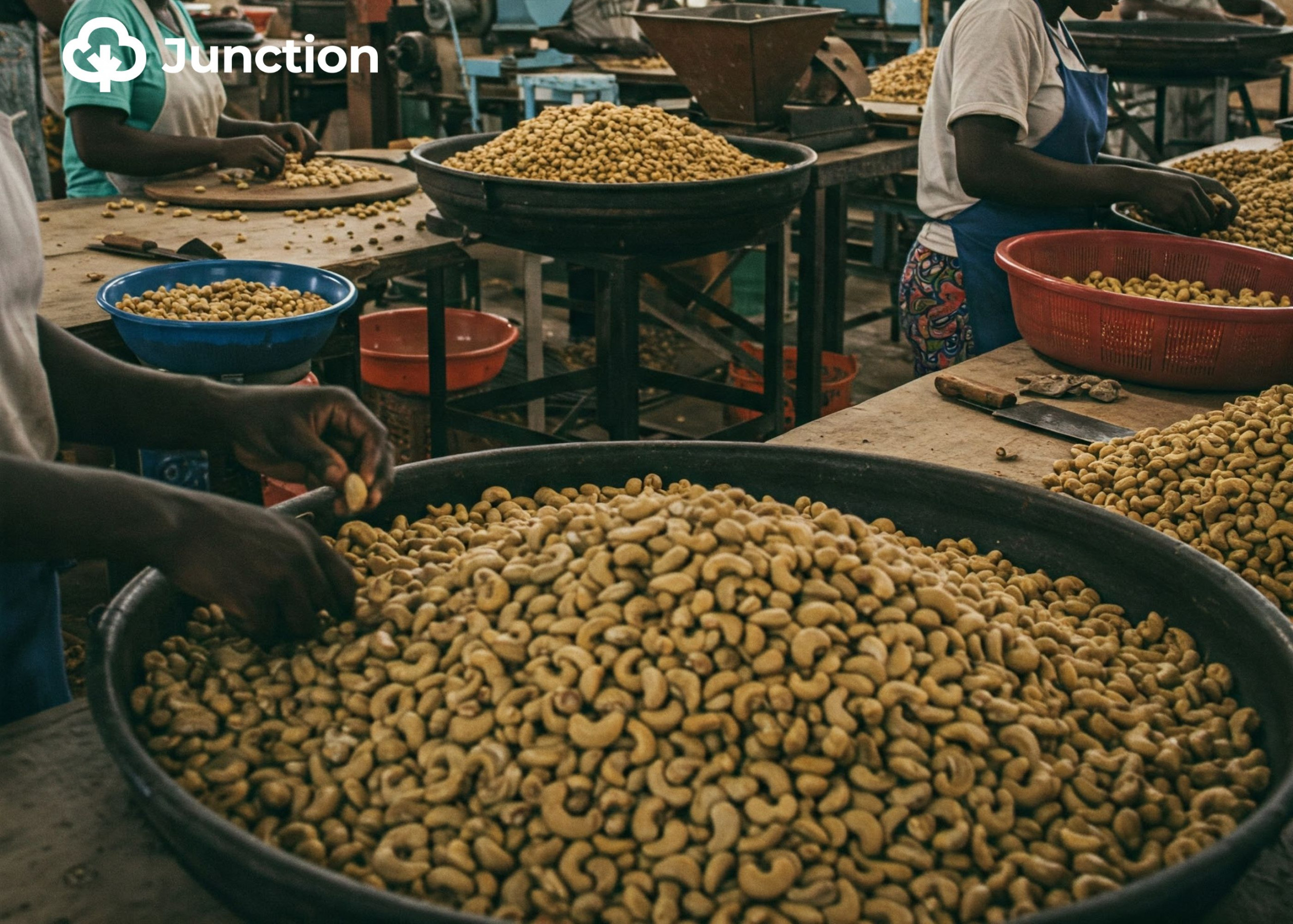News in Brief:
– Nigeria loses billions in potential revenue annually as Vietnam, the leading processor, imports and lucratively processes these nuts for the global market.
– The National Cashew Association of Nigeria (NCAN) is set to work with the Vietnamese government to act on Nigeria’s urgent need to invest in its own cashew processing.
Nigeria boasts substantial raw cashew nut production, with annual harvests around 240,000 metric tons and set to reach 300,000 metric tons by 2030. Farmers cultivate these valuable nuts across 19 states in the country.
However, the vast majority, around 85%, of these nuts are exported in their unprocessed form, primarily to countries like Vietnam and India. It effectively hands over processing, the most profitable stage of the cashew value chain.
Vietnam’s strategic processing advantage
Vietnam, unlike Nigeria, has strategically positioned itself as the world’s leading cashew processor. Vietnam remains the world’s largest cashew kernel exporter for 18 consecutive years, accounting for over 80% of the global export volume.
In 2024, Vietnam’s cashew kernel exports reached a record of approximately 730,000 tons, generating a staggering revenue of over $4.37 billion. This represents a significant increase in both volume (13.3%) and value (20.2%) compared to the previous year.
The numbers are a direct result of their investment in processing facilities and their ability to transform imported raw nuts. This includes significant quantities from Nigeria, into high-demand finished products.
These products include: cashew nut butter, cashew milk, and cashew cheese. Others are: cashew cream (vegan), cashew yogurt (vegan), cashew flour/powder, cashew oil, etc.
While Vietnam also participates in the raw cashew export market, its primary economic benefit from the cashew sector comes from this multi-billion-dollar processed kernel trade.
The billion-dollar disconnect: Nigeria’s lost earnings
The economic disparity between the two countries is glaring. Nigeria’s raw cashew nut exports in 2022 yielded approximately $252 million. Paling in comparison to the over $4.37 billion Vietnam earned in 2024 solely from exporting processed kernels.
Experts say this multi-billion-dollar difference highlights the immense profit Nigeria is missing out on by not processing its cashew bounty.
“The numbers speak for themselves. We are essentially providing the raw material for Vietnam to generate billions in revenue, revenue that could be bolstering our economy, creating jobs, and driving industrial growth if we had the processing capacity,” agricultural economist, Dr Adekunle Omotosho, said.
Why does Nigeria not process agricultural products?
Experts identify several factors that hinder the development of a robust cashew processing industry in Nigeria. These include:
- Insufficient Capital Investment: Establishing and operating modern processing plants demands significant financial resources, which have been largely lacking in the Nigerian cashew sector.
- Unreliable Power Infrastructure: Consistent and affordable electricity is essential for processing operations, and Nigeria’s persistent power challenges remain a major deterrent.
- Limited Access to Funding: Nigerian SMEs and potential processors often struggle to secure the necessary loans and financial backing to establish processing facilities.
- Deficiency in Technical Skills: A skilled workforce is required to operate and maintain sophisticated processing machinery, necessitating greater investment in training and technical education.
The significant economic ramifications for Nigeria
According to crop systems specialist, Timothy Agomah, the continued reliance on raw cashew exports has significant negative consequences for the Nigerian economy.
“It limits the agricultural sector’s contribution to the national GDP, restricts job creation in value-added industries, and leaves Nigeria vulnerable to fluctuations in global raw commodity prices,” he said.
“It’s a classic case of exporting jobs and potential wealth,” explains Dr Tolu Bamidele, a field agronomist/specialist based in Lagos. “Our farmers work hard to produce a valuable crop, but the real economic benefit is being captured elsewhere because we cannot transform these raw materials into finished products.”
The experts believe that Nigeria’s potential for a multi-billion-dollar cashew processing industry remains untapped. A reflection of its agricultural sector, which contributes less to the national GDP than it could if value addition through processing were prioritised.
The National Cashew Association of Nigeria (NCAN) had, in January 2025, also estimated that a thriving cashew processing sector could inject up to $3.7 billion annually into the Nigerian economy.
President of the association, Dr Ojo Joseph Ajanaku, stressed the significance of more investments in the overall cashew value chain.
“Essentially, we were once the highest producer of cashew in Africa before we dropped to the fourth position, where we are today. Now, if you look at the price that is already in the market, it’s about $1,700 per tonne. What this means is that we are looking at about $3.7 billion that will be netted into the Nigerian economy,” he stated.
The NCAN boss urged the federal government to make cashew a priority because of its potential.
Nascent efforts towards domestic processing
Recognising this economic leakage, both the Nigerian government and private sector stakeholders are beginning to explore avenues for investment in cashew processing.
Initiatives include financial incentives, infrastructure development plans. it also includes efforts to improve access to finance for processing ventures.
A significant step in this light is the recent meeting between the NCAN and representatives of the Vietnamese government in Abuja.
Dr Ojo Ajanaku, after the closed-door meeting, expressed hope that with the Joint Trade Committee (JTC) and additional Memoranda of Understanding (MoUs), things will take a more productive turn for the sector soon.
He added that the bulk of cashew processing would now be carried out locally, eliminating the need to export raw cashew nuts for processing abroad.
“I can say our farmers’ prayers have been answered. They will now be in high demand and valued for the quality of their produce. No longer will they be forced to give away their cashew at low prices; it will now command the worth it truly deserves,” he said.



